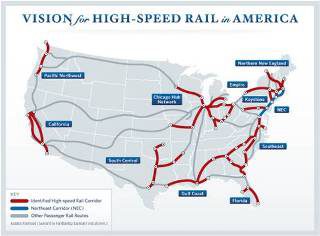
Lectures 10 and 14 of this course evaluate the effectiveness of producing high speed rail corridors in the United States. (Image source: United States Federal Government.)
Instructor(s)
Prof. Joseph Sussman
Carl D. Martland
MIT Course Number
1.011
As Taught In
Spring 2011
Level
Undergraduate
Course Description
Course Features
- Selected lecture notes
- Projects and examples
- Assignments: problem sets (no solutions)
- Assignments: written (no examples)
- Exams (no solutions)
Course Description
1.011 Project Evaluation covers methodologies for evaluating civil engineering projects, which typically are large-scale and long-lived and involve many economic, financial, social and environmental factors. The course places an emphasis on dealing with uncertainty. Students learn basic techniques of engineering economics, including net present value analysis, life-cycle costing, benefit-cost analysis, and other approaches to project evaluation. Examples are drawn from both contemporary and historical projects in various fields, including transportation systems, urban development, energy and environmental projects, water resource management, telecommunications systems, and other elements of the public and private projects and programs.
Other Versions
Other OCW Versions
Archived versions: ![]()


